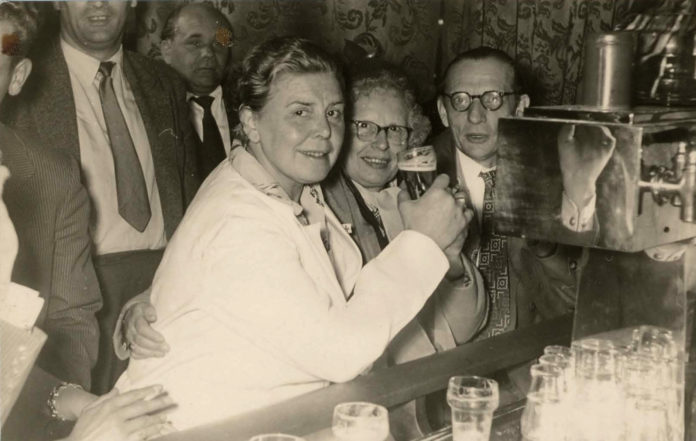
In 1927, Bet van Beeren might have been one of the only openly gay women operating an openly gay friendly bar worldwide. She founded Cafe ‘t Mandje in Amsterdam during a time when being queer was illegal. Businesses were encouraged to discriminate against marginalized groups. To own one was practically impossible.
But most people were also not like Bet, the eldest daughter of fourteen children. She acted as a brave advocate and pioneer of tolerance and human rights and became a legend in her community. Amsterdam’s community forced into hiding found visibility in watching the fearless activist riding through the city on her motorcycle, wearing a leather suit, and with a female lover sadled up behind her.

Jewish people found refuge in Bet’s bar attic during the Nazi occupation. Her mission of inclusion extended itself to individuals outside her identity. The bar – located at the historic Zeedijk near the Redlight District – welcomed sex workers in to relax and drink without judgment or fear. The army warned soldiers to avoid the area, so the Cafe’s proximity to the District saved it from armed harassment during World War II. Bet also enforced rules out of an abundance of precaution, which allowed hand holding but no kissing. Male patrons who violated these rules encountered a drunken Bet, cutting off their tie and hanging it from the ceiling.
After Bet fell ill due to liver disease, her youngest sister Greet continued running the business under the same values, even after Bet died in 1967. However, the labor became too much, and the neighborhood faced a heroin epidemic, so Greet eventually closed the business in 1982. Fortunately, even after the bar shut down, Greet ensured the preservation of the space and interior, keeping her sister’s legacy alive. Amsterdam Museum adopted certain items from the bar into its collection, but aside from that, the building remained as it was.
In a film (1998) made by the museum about Cafe ‘t Mandje, Greet emphasizes the bar’s significance: “That was the pub’s appeal: Everyone was a guest, being gay was irrelevant… Bet certainly was a pioneer when it comes to gay integration.”

Café Mandje’s website reads, “Greet’s wish the bar would reopen again, leaving everything intact, just like in Bet’s days. She closed the bar in 1982 but aired, dusted, and vacuumed the place weekly. She also kept the heater going. Had she not done that, everything would have disintegrated.”
Greet coordinated the relaunching of the bar right before her death in 2007, and in 2008, Bett Van Beeren’s niece Diana Vann Larr reopened Café ‘t Mandje’s doors to an eager public ready to celebrate the survival of queer history.
Vann Larr told Off Route Amsterdam that she didn’t grasp how wide and far her aunt’s influence reached until she was older. “I knew she was famous in some way, but I did not understand what that was all about… She openly proclaimed that she was a lesbian, and that was a big deal in those days. A woman with a big heart too.”
She made sure to brand the space with the same colorful principles. “Not gay, not straight, not lesbian but for everyone who understands the spirit of Bet.”
Amsterdam might be considered one of the most accepting cities in the world, but bigotry can be traced back even in the most welcoming places. Café ‘t Mandje hosted one of the first gay marriages in Amsterdam after its legalization in 2001, even though the bar wasn’t yet reopened. Café ‘t Mandje is credited today as a contender for the oldest gay bar in the world.
Bet Van Beeren’s family protected the space like a sanctuary and succeeded in maintaining its unparalleled ability to transport you back in time. Original memorabilia of the enigmatic Van Beeren sisters proudly hangs at the bar’s entrance window. You might even spot a few (now vintage) ties still dangling from the ceiling.

On Café ‘t Mandje’s 90th anniversary in 2017, Amsterdam renamed a bridge to honor Bet van Beeren as a metaphor for all the bridges she built in her community, uniting locals from all walks of life.
Van Larr promised to channel her aunt’s willful spirit in Café ‘t Mandje’s promising future. The bar’s resilience survived a pandemic and has continued to thrive as a beloved staple in queer culture.
“Free, open to others … but also a strong sense of what is O.K. and what is not. Amsterdam is not like this everywhere, but for me, that is Amsterdam at its best.”









